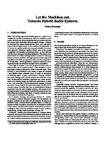Let the machines out. towards hybrid social systems
| dc.contributor.author | Straeubig, Michael | |
| dc.date.accessioned | 2019-10-07T09:56:45Z | |
| dc.date.available | 2019-10-07T09:56:45Z | |
| dc.date.issued | 2017-01-01 | |
| dc.identifier.uri | http://hdl.handle.net/10026.1/14967 | |
| dc.description.abstract |
INTRODUCTION When Alan Turing proposed the imitation game as a method to investigate the question if machines can think, he described a social system. However, the various disciplines that have pursued this seminal enquiry rarely touch base with sociological concepts. Cybernetics developed into various interdisciplinary fields, yet it was mainly rooted in physiological models. In the meantime, the mainstream of AI focused on cognitive problem solving, predominately from a topdown approach. Traditional cognitive science rests on the concept of organisms as information processing systems - so does Artificial Life, but from a biological simulation perspective. The recently revitalised branch of machine learning has been successful in deploying bottom-up models combined with large amounts of data. Large scale simulations of the brain are expected to deliver new knowledge about the human brain. ”Second-generation” cognitive science and developmental robotics are embodied and apply neural computation. | |
| dc.format.extent | 28-31 | |
| dc.language.iso | en | |
| dc.title | Let the machines out. towards hybrid social systems | |
| dc.type | conference | |
| dc.type | Conference Proceeding | |
| plymouth.publication-status | Published | |
| plymouth.journal | Proceedings of AISB Annual Convention 2017 | |
| plymouth.organisational-group | /Plymouth | |
| plymouth.organisational-group | /Plymouth/Faculty of Arts, Humanities and Business | |
| plymouth.organisational-group | /Plymouth/Faculty of Arts, Humanities and Business/School of Art, Design and Architecture | |
| dcterms.dateAccepted | 2017-01-01 | |
| dc.rights.embargodate | 2023-9-23 | |
| dc.rights.embargoperiod | Not known | |
| rioxxterms.licenseref.uri | http://www.rioxx.net/licenses/all-rights-reserved | |
| rioxxterms.type | Conference Paper/Proceeding/Abstract |


